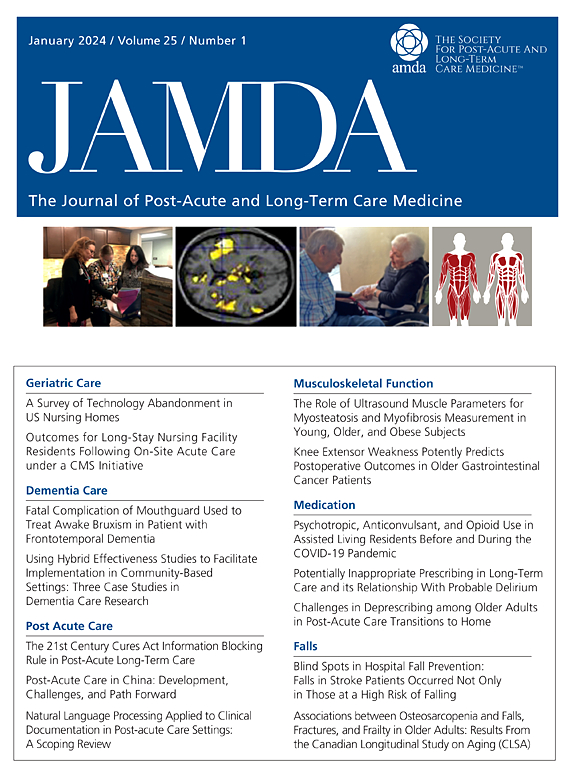团队指导干预痴呆护理:护理社区的可接受性和可行性研究。
IF 4.2
2区 医学
Q2 GERIATRICS & GERONTOLOGY
Journal of the American Medical Directors Association
Pub Date : 2025-02-01
DOI:10.1016/j.jamda.2024.105379
引用次数: 0
摘要
目标:2018年,阿尔茨海默病协会发布了《痴呆症护理实践建议》(DCPR),为专业人员提供优质护理指导。本研究旨在探讨咨询辅导计划的可行性和可接受性,以提高DCPR的采用。设计:采用单组岗前设计。实施了为期6个月的团队指导干预,以在(1)政策和程序,(2)教育和培训,或(3)护理实践方面实现组织范围内可衡量的变化,以增加以人为本的护理实践。环境和参与者:华盛顿州和蒙大拿州共有36个护理社区参加了这个项目。方法:采用焦点小组法,探讨项目的可接受性和可行性。在项目前后进行了一项包含35个项目的员工满意度调查。结果:本研究结果提供了初步证据,证明实施辅导计划是护理社区员工所期望的,并且对员工的工作满意度和以人为本的护理的使用有积极的影响。教练模式被员工视为一种支持和肯定的计划。结论与启示:团队指导干预,旨在提高以人为本的护理和员工满意度,是可以接受的。然而,其有效性需要使用随机对照设计在更大的样本中进行测试。本文章由计算机程序翻译,如有差异,请以英文原文为准。
A Team Coaching Intervention for Dementia Care: Acceptability and Feasibility Study in Care Communities
Objectives
In 2018, the Alzheimer's Association published the Dementia Care Practice Recommendations (DCPR) to provide guidance on quality care for professionals. This study aimed to examine the feasibility and acceptability of a consultative coaching program to increase adoption of the DCPR.
Design
A single-group pre-post design was employed. A 6-month team coaching intervention was implemented to make organization-wide and measurable changes in the areas of (1) policies and procedures, (2) education and training, or (3) care practices to increase person-centered care practices.
Setting and Participants
A total of 36 care communities in Washington and Montana states were enrolled in this program.
Methods
Focus groups were conducted with participants to explore the acceptability and feasibility of the program. A 35-item employees satisfaction survey was administered both before and after the program.
Results
The findings offer preliminary evidence that implementing a coaching program is desired by care community staff and has a positive impact on staff job satisfaction and the use of person-centered care. The coaching model was received by staff as a supportive and affirming program.
Conclusions and Implications
The team coaching intervention, designed to improve person-centered care and employee satisfaction, is acceptable. However, its efficacy needs to be tested with a larger sample using a randomized controlled design.
求助全文
通过发布文献求助,成功后即可免费获取论文全文。
去求助
来源期刊
CiteScore
11.10
自引率
6.60%
发文量
472
审稿时长
44 days
期刊介绍:
JAMDA, the official journal of AMDA - The Society for Post-Acute and Long-Term Care Medicine, is a leading peer-reviewed publication that offers practical information and research geared towards healthcare professionals in the post-acute and long-term care fields. It is also a valuable resource for policy-makers, organizational leaders, educators, and advocates.
The journal provides essential information for various healthcare professionals such as medical directors, attending physicians, nurses, consultant pharmacists, geriatric psychiatrists, nurse practitioners, physician assistants, physical and occupational therapists, social workers, and others involved in providing, overseeing, and promoting quality

 求助内容:
求助内容: 应助结果提醒方式:
应助结果提醒方式:


